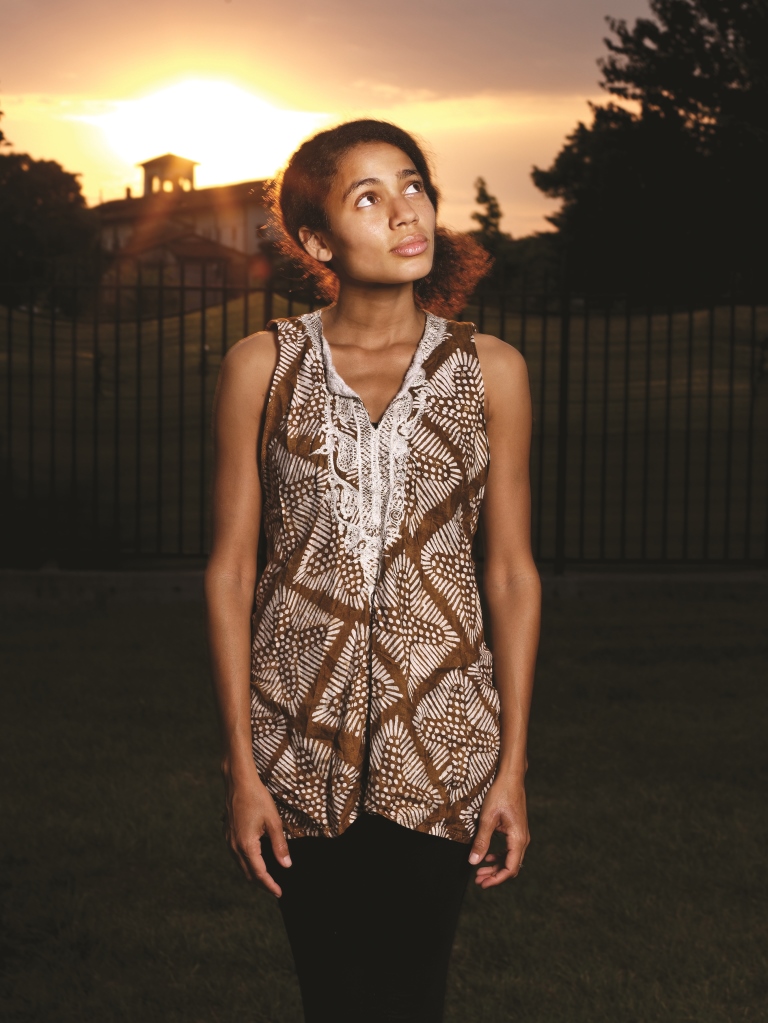Perched on a stool with a spotlight sculpting her fine face with light and shadow, Nneka strums her guitar and melancholically sings lyrics with both religious and political undertones.
“Your phrases are highly majestic, I am amazed by your great linguistics, yet your words are placed together, to sell dubious manifestoes,” says Nneka.
The audience sits in silence as the stars shine in the dark sky spanning above the auditorium in the Ghanaian capital of Accra.
Tonight, Nneka casts a fragile form—her signature sprawling afro is pulled back, her diminutive figure is shrouded in layers of grey, and she is awkwardly reticent throughout the performance. But if Nneka’s music has a central theme it is that appearances can often be deceptive. The German-Nigerian singer’s delicate beauty and soft voice belie the anger, the confusion and sense of injustice threaded throughout the lyrics of her songs.
For the past two years Nneka has been touring Europe, East Africa and her motherland to promote her third album Soul is Heavy, which was released last year . Written and recorded over three years in her home city of Lagos, the album is both thematically and stylistically eclectic with reggae, hip-hop, soul and afrobeat influences. Her songs address corruption, neo-colonialism and oppression, as well as more introspective matters of the heart and soul.
Loading...
Nneka has made her way from being a little-known singer-songwriter to an internationally acclaimed artist who has toured with the likes of American singer Lenny Kravitz and New York rapper Nas. But gaining recognition in her homeland was difficult, at least until her big break in 2010 when she performed her hit single “Heartbeat” on the David Letterman Show and later appeared on CNN.
“Before Letterman, before CNN nobody wanted to hear my stuff in Nigeria. It was quite difficult for people to relate to my music because the topics are quite heavy: I talk about corruption, I talk about hypocrisy and things that I deal with on a daily basis that we Africans and Nigerians deal with on a daily basis. Many people are very scared of facing those issues they would rather you entertain them,” she tells me during an interview at a restaurant in Accra.
Nneka says the popularity she gained in Nigeria, due to her overseas success, was an example of the “colonial mentality”, which is still pervasive throughout Africa.
“It’s an inferiority complex that we are not very aware of. We are really not proud of ourselves.”
But the singer says that while Nigerians are often drawn to the shiny and superficial; “political” music is becoming increasingly popular in Nigeria, as shown during the Occupy Nigeria protest movement last year, which was sparked by the removal of fuel subsidies and inspired by the Arab Spring.
“There are lots of musicians and artists who are becoming more conscious about their surroundings and courageous in speaking out their minds, when it comes to speaking out about our state and our condition and the system,” says Nneka.
While the singer describes her homeland as divided and corrupt, she says the Occupy Movement, at which she performed, gave her hope that things in Nigeria can change.
“A demonstration like that hasn’t been done in my lifetime. It was a peaceful demonstration—people of different tribes gathered, Christians and Muslims were praying together. Seeing so many people in one place having the courage to speak their minds helped connect us amongst ourselves.”
The artist was inspired by the pain and injustices she saw in Warri in the Niger Delta, a city where economic division and ethnic conflict are rife.
“When you grow up in that area, you either become a militant or maybe a musician. There is so much grief and tribal war and so much conflict,” she says.
But Nneka says Nigerians continue to hold on to the hope that their country can change and that some kind of revolution will take place in the future.
“We need proper leadership, selfless politicians who are not in power looking to profit, we need government to be more concerned about the youth and we need more rich people that are concerned about the poor.”
On what inspires her creatively, Nneka is endearingly bumbling and inarticulate. She cites spiritual figures such as Gandhi, Jesus and Saint John the Baptist and iconic African leaders like Thomas Sankara, Kwame Nkrumah and Patrice Lumumba, as figures who have informed her ideas and lyrics. Like these great men, Nneka sees herself as a spokesperson of the poor and the oppressed.
“Seeing the many people who are sick in the Delta due to the pollution, and the deaths… being from that area alone has made me into who I am. I feel it is my responsibility to be the voice for those who don’t have the courage,” says Nneka.
Loading...
